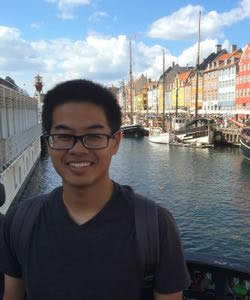Browse the Facebook profiles of any student at the Danish Institute for Study Abroad (DIS), and you will more than likely find a picturesque photo of them in front of the colorful houses of
Nyhavn. These beautiful colors paired with the calm canal water are a scene right from a postcard. Copenhagen appears to be a paradise. From researching Copenhagen as a study abroad spot to my daily train ride into the city, I hear comments about Danes being the happiest people on Earth, free healthcare, and Copenhagen being the site of three “top 50 restaurants in the world”—a veritable utopia.
Browse the local news or dig a little deeper, and one soon finds out that Copenhagen, or Denmark for that matter, is not as perfect as your average travel blog might suggest. Denmark is currently dealing with its own social issues—racism, refugee flows, brain drain—issues one does not expect to find in a seemingly egalitarian society. Yet in my short month-and-a-half here, I have seen bus drivers turn away Syrian refugees, heard Islamophobic comments, and been the target of various racial insults.
These deeper issues facing Denmark contrast sharply with its international reputation. Within the OECD states, Denmark ranks first in terms of equality with a Gini coefficient of just 0.25. The Gini coefficient is a number that measures income inequality within countries, and Denmark soundly beats developed countries like the United States, which comes in the bottom five along with Mexico, Chile, Turkey, and Israel. It has been utterly baffling to me that a country that possesses open access to quality healthcare and has significantly closed the gender gap can turn a cold shoulder to refugees. And yet, it makes sense to a certain extent—Danish culture and society are tribal and insular in nature. Rather homogeneous and possessing rigid social norms, Danish society functions like a well-oiled machine, where every Dane plays a part in the harmonious operation of the whole. It is therefore not as surprising that the sudden influx of refugees would disrupt and disturb the “normal” functioning of society.
Nonetheless, changing economic and social realities do not excuse the lack of care for refugees, an issue grounded in international law. Not more than a few weeks ago, Danish governmental funds were utilized to dissuade asylum seekers from coming to Denmark. The Danish-German border was closed to control immigration. As a wealthy country, Denmark is seen by many to have an obligation to take care of these refugees, an obligation it is failing to meet.
The reality is that Denmark is facing many social issues right under the utopian veneer. Yet while many have taken harder stances against refugees and adopted xenophobic views, even more are caring and wish to help however possible. Danes against anti-immigration policies have protested in front of parliament, offered help to refugees arriving in the central train station, and spent money to publish new ads welcoming refugees to Denmark as a safe haven. Danes have offered their homes as shelter. There is even a particularly moving and humanizing photo of a Danish police officer playing with a young refugee girl at a border crossing.
More and more, I hear DIS students remarking in hushed voices how Copenhagen is not as socially radical or egalitarian as they had imagined when applying to study in the country. I occasionally find myself thinking in a similar way. It is hard to accept that a country that was built up to be so “perfect” in those postcards and travel blogs can be undergoing such drastic social problems.
Now, when I look at a postcard of the rainbow-colored houses in Nyhavn, I remind myself that Danish culture is just as diverse as those colors. While it is not as “perfect” as I had imagined or hoped, this is a society whose members have already begun to acknowledge their shortcomings and attempt to improve. I have met many Danes determined to change how their society has chosen to address these issues, and in the process, I have found a city and a country trying its very best to be the Denmark we all see in those idyllic postcards.

